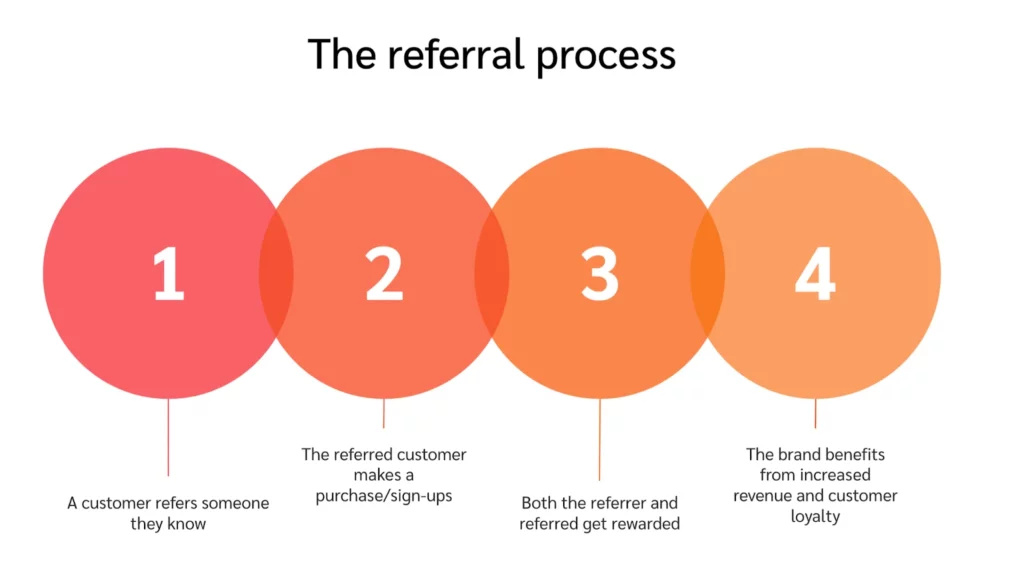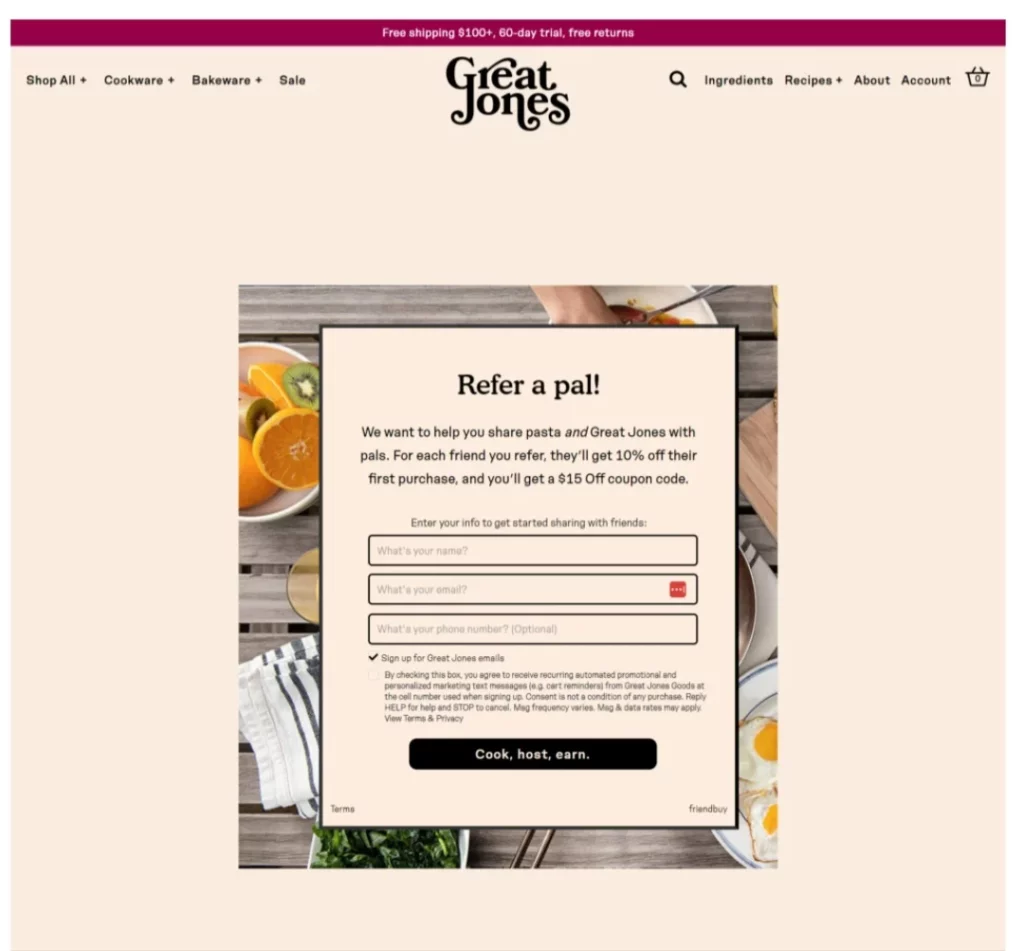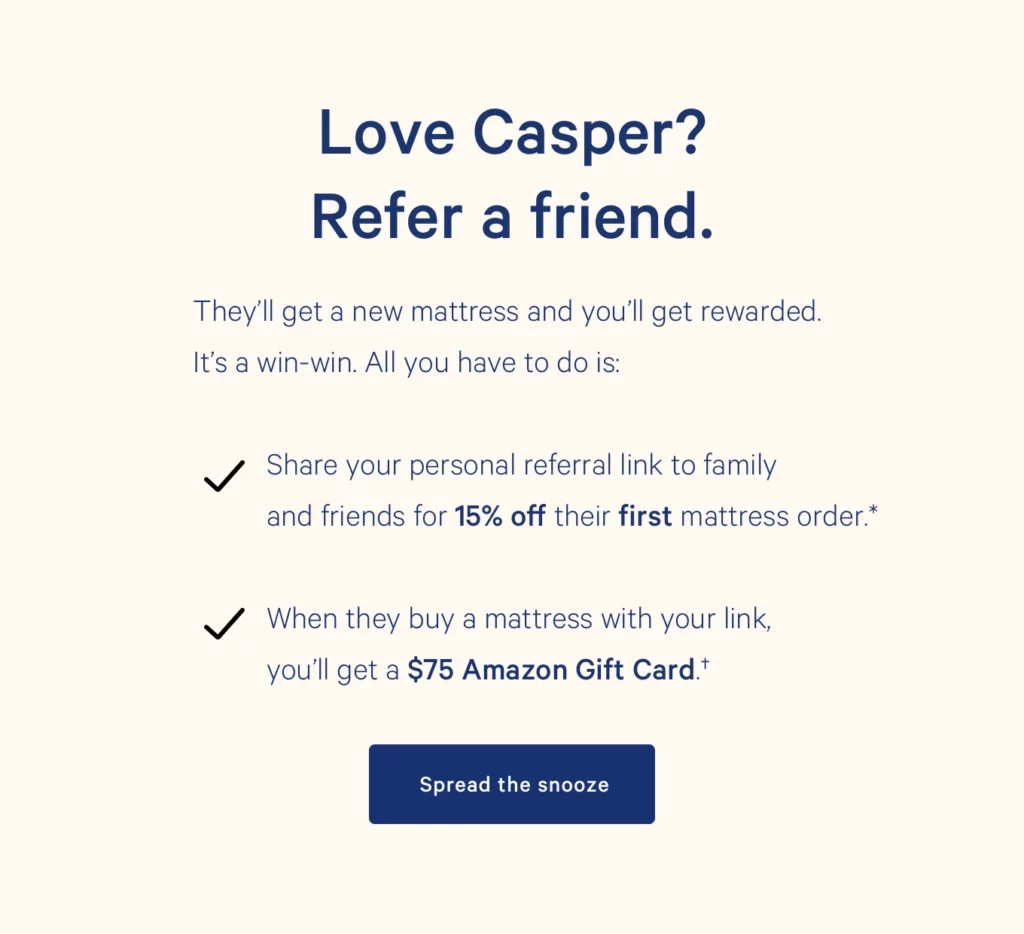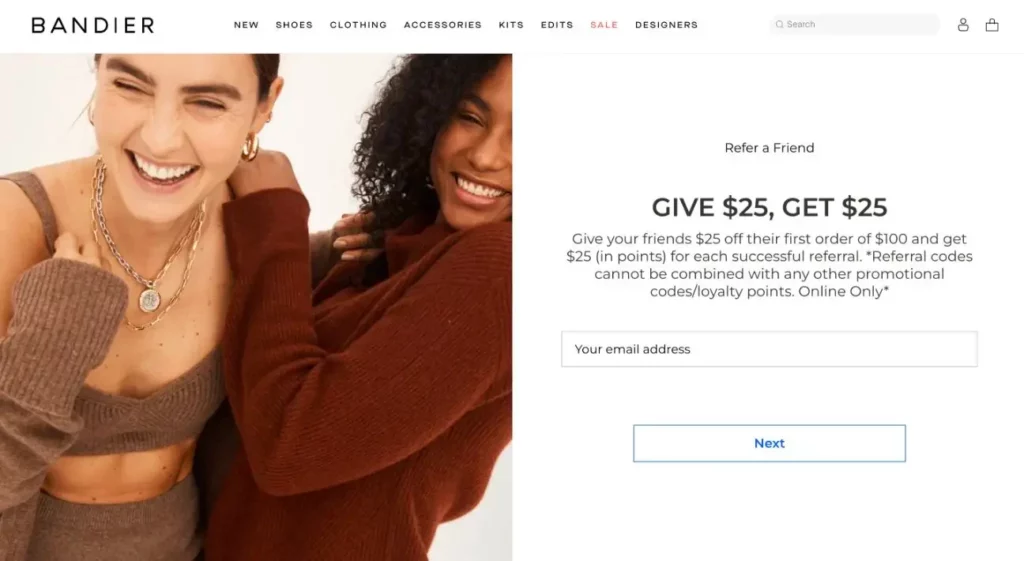Key takeaways
- Referral marketing is a low-cost, high-return channel where brands reward customers for recommending their products or services.
- Incentives come in many forms, including cash rewards, points-based systems, access to free products and services.
- Mobile apps and referral templates make the referring process quicker and more convenient for customers.
- Great Jones, Casper, and Bandier built successful referral programs by engaging customers and enticing them with special incentives.
- A referral platform helps businesses optimize their strategy and maximize the number of successful customer referrals.
Give a little, get a little. That’s the idea behind referral marketing. Your brand can offer customers incentives for driving sales to your brand—and your fans get to share great products with people in their circle.
It works so well because consumers trust the opinions of people they know—88 percent of people trust recommendations from friends and family.

Plus, this channel offers high returns without a huge up-front investment. You won’t find a better advocate for your brand than the people who use your products. And you can reward your customers in a way that works for your brand, such as:
- Cash-back rewards
- Points
- Gifts
Add automation tools into the mix, and managing your referral program becomes a breeze.
Let’s look at how to build a successful referral marketing strategy and how top retail brands achieve this.
The benefits of a referral program
Referrals can be a game-changer for your business by growing your customer base while building strong relationships with your existing customers. When you encourage your current customers to recommend your brand to their friends and family, you build credibility and trust in the eyes of potential customers. A referral program also minimizes marketing costs and nurtures a pipeline of high-quality leads, resulting in sustainable brand growth.
Get low-cost marketing by incentivizing loyal customers
You can get low-cost marketing that drives sales and encourages customer loyalty by incentivizing loyal customers to refer their friends and family to your business. Since you only pay for results, you won’t have to worry about pouring money into ads and content that might not convert.
Instead, you can focus on building and rewarding customer loyalty. Plus, with referral marketing, you can track and measure results for a clear picture of your brand’s return on investment (ROI).
Here’s how it works: An online clothing brand creates a referral program that offers customers an instant discount when they share a referral link with someone they know. When the referred friend purchases using the discount code, the original referrer receives a code for the next purchase.
Not only does this drive sales, but it also encourages customer loyalty and incentivizes both parties to return to the online shop. With a referral program, you can achieve similar benefits and advance your retail business.
Expands your brand’s reach through authentic word-of-mouth

Word-of-mouth recommendations are impactful, especially when they come from trusted individuals. This is where a referral program comes in. You expand your reach beyond traditional marketing efforts by encouraging customers to spread the word about your brand.
Here’s how it works: A beauty brand recently launched a new skincare line and offered discounts to customers who referred their friends. By tapping into the credibility and trust established within social circles, the brand was able to boost sales of the new line and introduce new customers to their entire product range.
Generates high-quality leads with customers primed to purchase
When it comes to referral marketing for retail, it’s all about quality over quantity. You want to attract leads interested in your products and primed to purchase. By strategically identifying and engaging with the right customers, you tap into a pool of individuals already interested in buying. This strategy drastically reduces the chances of attracting low-quality leads that may not convert.
Here’s how it works: An electronics retailer partners with tech bloggers with an engaged audience that loves gadgets and electronics. The referrals generated through these creators are more likely to convert into buyers because they’re already interested in the retailer’s products.
7 referral marketing strategies to gain new customers
Incorporating these seven referral marketing strategies into your customer acquisition playbook can yield remarkable results. By providing customers with the right tools and incentives, you can turn them into valuable brand advocates, driving new business your way.
1. Offer cash rewards
One surefire way to motivate customers is by offering cash rewards for referrals. People love immediate gratification, so giving them instant financial gain for sharing your products can pay off.
How this works: A ride-sharing platform rewards existing users with a $10 credit for each successful referral, making it a win-win for both parties. With the right approach, referral marketing is a powerful tool for building customer loyalty and growing your business.
2. Create a points-based system
Another effective strategy is creating a points-based system. Your loyalty program should give your customers points for each successful referral. Then, customers can use these points to redeem free products, discounts, or exclusive offers. This system encourages customers to refer more people and nurtures ongoing engagement and loyalty.
How this works: An online jewelry store introduces a points-based referral program where customers earn 100 points for every friend they refer. Once customers reach 500 points, they can redeem them for free products. Customers are then motivated to bring in multiple referrals to unlock valuable rewards, like a considerable discount. This creates a win-win situation for both the customer and the retailer. The customer is rewarded for their loyalty, and the retailer gets new customers.
3. Give customers access to free products

Another useful strategy is giving your customers access to free products or exclusive services when they successfully refer your business. This delivers additional value to your customers and uses the allure of receiving something valuable for free. Gifting makes it more likely for customers to say good things about your brand and encourage widespread sharing and engagement.
How this works: A subscription-based streaming service allows users to watch a new hit movie for free when they refer three friends to sign up. The brand encourages widespread sharing and engagement by tapping into customers’ desire to experience premium content.
4. Ask for referrals at the right time
Timing is everything, so it’s best to reach out to your customers when they’re most satisfied. For example, you may want to contact a customer after they purchase or interact positively with your customer service team. This tactic increases the chances of receiving enthusiastic referrals and recommendations.
How this works: An ecommerce store sends a personalized referral request email to customers immediately after they complete a purchase. The email thanks them for their business and encourages them to share their experience with friends. This positive messaging at the right time encourages customers to say good things about your brand.
5. Leverage mobile apps

One great way to boost your referrals is by incorporating them into your mobile app. By creating a simple signup process and making it easy for users to invite their friends, you reach a broader audience and expand your user base.
How this works: A fitness brand could include a “Refer a friend” feature directly in their app interface, allowing users to invite friends with just a few clicks. A frictionless experience encourages more referrals and ultimately helps the business grow.
6. Provide referral templates for customers
By offering pre-designed templates, you make it easy for happy customers to share their positive experiences with their network. This removes the guesswork for customers and ensures consistency in messaging, making them more likely to advocate for your business.
How this works: A grocery store that delivers locally provides its customers with email and social media copy they can easily share. It’s effortless for customers to refer to the store, and that’s precisely the streamlined strategy that helps businesses grow.
7. Use a referral marketing platform for success
A referral platform can be the key to success when it comes to referral marketing for retail. This software helps you easily manage all your referrals and rewards in one place, giving you access to features like automated emails, custom campaigns, detailed analytics, and more.
A winning referral marketing platform should also offer various incentives that differentiate you from your competition. Creating personalized rewards makes it easier to target potential customers and nurture their loyalty.
Using a referral platform, like SaaSquatch streamlines the process of managing referrals, giving you more time to focus on what matters most—growing your business and building customer relationships. The right platform can help you design an effective program that is easy for customers to understand and encourages them to share more referrals.
Having an automated system also ensures that you don’t miss out on any referrals, allowing you to track their progress and measure your success. With these insights at your fingertips, optimizing your strategy and maximizing the number of successful customer referrals is easier.
3 retail brands that did referral marketing right
Referral marketing has become one of the most effective ways businesses can generate new leads and increase customer acquisition. By integrating referral systems into their business models, these brands have created mutually beneficial relationships with both referrers and the referred.
1. Great Jones offers coupons and discounts

Great Jones’s referral program offers a 10 percent discount for the referred and a $15 off coupon for the referrer. This dual benefit entices both the referrer and the referred friend to purchase.
The eye-catching landing page highlights its cookware with background images. Casual language like “pals” instead of “friends,” and unique call-to-actions (CTAs) like “cook, host, earn,” add a fun and engaging tone. Great Jones is a great example of how effective referral programs can reach the right audiences.
2. Casper rewards with gifts and discounts

Casper’s referral email is an example of how simplicity increases engagement. On a successful referral, the referred receives 15 percent off a new mattress purchase. Once the order is confirmed, the referrer receives a $75 Amazon gift card.
The concise, action-oriented copy clearly explains the referral program’s benefits. Additionally, the CTA has a hint of humor that further engages consumers.
This referral program shows how brands can use multiple incentives to make referral programs more enticing for the referrers and referred.
3. Bandier uses a points-based system

Bandier’s “Refer a Friend” program allows the referrer and their referred friends to get $25 in points when the friend makes a purchase. Customers continue to earn points for each successful referral. This ongoing points system encourages referrers to make multiple referrals to accumulate enough points for free products. Additionally, the landing page has a clear-cut design with a quick CTA to sign up via email.
Referral marketing attracts new customers with the power of trust
Referral marketing is a cost-effective approach that taps into the trust and loyalty of existing customers to attract new ones. By incentivizing customers, you can turn them into brand advocates and fuel business growth. Strategies such as cash rewards, points-based systems, and in-app mobile offers have proven successful for retailers of all sizes.
Using a referral platform further streamlines the process and enhances results. With effective referral marketing, retailers can drive substantial growth and foster valuable customer relationships.
Ready to learn more about referral marketing and other types of partnerships? Check out these impact.com resources to get you started:
- Ultimate guide to partnership marketing [ebook]
- 9 types of partnership marketing [with examples] [blog]
- How to start a partnership marketing program [blog]
- 4 major retailers that crushed their revenue goals using partnership marketing [blog]
- Digital Coupons 101 [Plus, 4 tips to win with partnerships] [blog]
- Partnerships: A low-cost way for ecommerce businesses to expand revenue and brand awareness [blog]
- 3 referral marketing methods to acquire new customers
FAQs about referral marketing
Referral marketing is when businesses incentivize customers to recommend their products or services to others. It’s a comprehensive strategy that encourages passionate customers and brand advocates to directly refer their inner network to your business.
Referral marketing offers a cost-effective approach to customer acquisition, generating high-quality leads through trusted recommendations. By leveraging existing customers as advocates, businesses enhance brand credibility, expand reach, and foster customer loyalty.
Referred customers are more likely to convert and become engaged, loyal patrons. Personalized marketing, data insights, and scalability further contribute to its value. With its positive impact on brand perception and competitive advantage, referral marketing is a strategic growth driver in the modern business landscape.
Direct rewards such as cash, discounts, or gift cards: Offering direct rewards is a straightforward and enticing way to motivate customers to refer your products or services. These rewards can come in cash, discounts, or gift cards, providing customers with immediate and tangible benefits for their efforts.
Points-based systems: Using a points-based system turns the referral process into a game where customers accumulate points for each successful referral. These points can be redeemed for various rewards, creating a sense of achievement and engagement.
Tiered incentives: A tiered incentive structure motivates customers to refer multiple friends by offering increasing rewards as they achieve higher referral goals. A multi-level approach acknowledges and rewards customers for their escalating level of advocacy.





